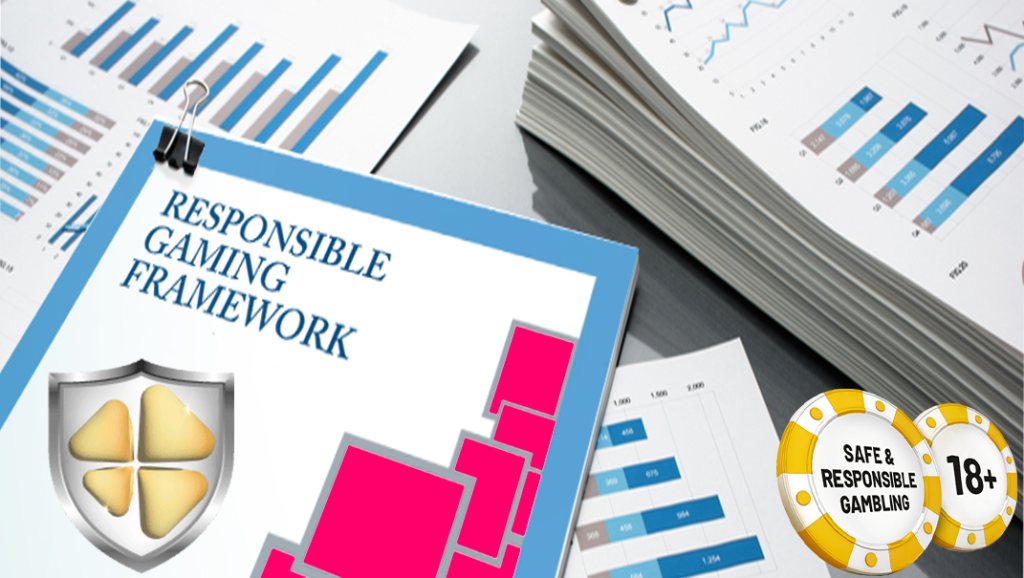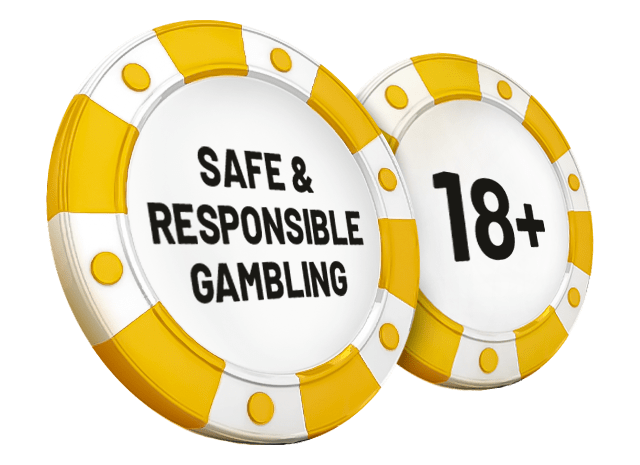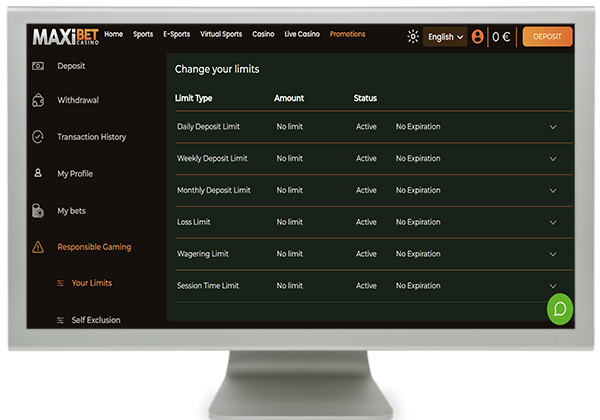Online Casino Anti Money Laundering Rules
At topcasinogames, we prioritize the safety and security of players by promoting online casinos that strictly adhere to Anti-Money Laundering (AML) regulations. AML policies are essential for maintaining the integrity of the gaming industry by preventing illegal activities such as fraud and money laundering. The online casinos listed on our platform implement robust security protocols, including identity verification, transaction monitoring, and Know Your Customer (KYC) processes. This ensures a transparent, legal, and safe environment for all players. By choosing to play at these regulated casinos, you not only enjoy top-tier gaming experiences but also have peace of mind knowing that your financial information is protected. Trust the casinos we recommend for a secure, fair, and compliant gaming experience.

Online Casino Anti Money Laundering Rules
In the rapidly growing world of online casinos, maintaining a secure and fair gaming environment is essential. One of the primary challenges that the industry faces is the risk of money laundering. Criminals may attempt to exploit online platforms to clean illicit funds by disguising their origins through casino transactions. To combat this, online casinos must adhere to strict Anti-Money Laundering (AML) regulations, ensuring that all players and transactions are legitimate and transparent. At TopCasinoGames, we understand the importance of these regulations and only feature online casinos that fully comply with international AML laws, safeguarding players and the integrity of the gaming industry.

What is Money Laundering? Money laundering is the illegal process of disguising the origin of money obtained through criminal activities, such as fraud, drug trafficking, or corruption. Criminals move illicit funds through different transactions and channels to make them appear as if they were obtained legally. Online casinos, with their high transaction volumes and potential anonymity, can be prime targets for such activities. To protect against this, regulatory authorities have introduced AML policies that every licensed online casino must follow.
Why AML Rules Are Crucial for Online Casinos? AML rules are essential in preserving the reputation of the online gambling industry. Without them, online casinos could become platforms for criminal activities, putting both the industry and legitimate players at risk. Trust is a key factor in the success of online casinos. Players need to feel confident that their funds are safe, their personal information is protected, and the games they are playing are fair. By adhering to AML regulations, online casinos help foster a transparent environment where illegal activities are prevented, and legitimate gaming can thrive. Additionally, governments and international regulatory bodies hold the gaming industry accountable for detecting and reporting any suspicious activities.
This includes implementing Know Your Customer (KYC) policies to ensure that players are who they say they are, monitoring transactions for unusual patterns, and reporting any red flags to financial authorities. Failure to comply with these regulations can result in hefty fines, revocation of gaming licenses, and irreparable damage to a casino's reputation.
How AML Rules Work in Online Casinos?
Online casinos implement several measures to comply with AML laws and prevent money laundering:
- Know Your Customer (KYC) Procedures: One of the most critical steps in AML compliance is KYC, where casinos verify the identity of each player. This typically includes collecting government-issued identification, proof of address, and sometimes additional documents to ensure that all players are legitimate. KYC also helps online casinos verify the source of a player's funds.
- Transaction Monitoring: Casinos are required to monitor all financial transactions for any suspicious behavior, such as unusually large deposits or frequent withdrawals. Patterns that suggest money laundering are flagged and reported to financial authorities.
- Deposit and Withdrawal Limits: To reduce the risk of money laundering, many casinos set daily, weekly, or monthly limits on deposits and withdrawals. This limits the ability of criminals to move large amounts of illicit funds through the casino platform.
- Reporting Suspicious Activities: If an online casino identifies any questionable behavior, it is obligated to report it to the appropriate authorities. This can include unusually high-stakes bets, attempts to avoid KYC procedures, or players who frequently switch between multiple accounts.
- Data Protection: AML rules often go hand-in-hand with data protection. Casinos must ensure that player data is encrypted and securely stored to prevent identity theft and other forms of fraud.
The Casinos Listed on TopCasinoGames and AML Compliance: At TopCasinoGames, we take player safety very seriously. That's why every online casino featured on our platform is carefully vetted to ensure they comply with the strictest AML and KYC procedures. We only recommend casinos that operate under licenses from reputable regulatory bodies, such as the UK Gambling Commission, the Malta Gaming Authority, and other internationally recognized authorities. These regulators enforce stringent AML standards, ensuring that the casinos operate ethically and transparently.
Our goal is to offer players a secure and enjoyable gaming experience. By featuring casinos that prioritize AML compliance, we help protect you from fraud and money laundering while ensuring the platform is fair and reliable. Players can enjoy peace of mind knowing that they are playing at licensed and regulated online casinos where their financial and personal information is protected.
Anti-money laundering rules are essential in maintaining a safe, legal, and enjoyable online casino experience. The implementation of these regulations not only protects the integrity of the gaming industry but also ensures that players can trust the platforms they use. At topcasinogames, we are committed to providing a curated list of casinos that adhere to the highest standards of AML compliance, ensuring that you can play with confidence. By choosing one of the casinos listed on our website, you can enjoy your favourite games while knowing that your safety is a top priority.

What Is Anti Money Laundering?
Understanding Anti-Money Laundering (AML) – Anti-Money Laundering (AML) refers to the set of laws, regulations, and procedures designed to prevent, detect, and report money laundering activities. Money laundering is the process of concealing the origins of illegally obtained funds, often by passing them through a complex series of transactions that make the money appear legitimate. The goal of AML practices is to ensure that financial systems, including online casinos, are not exploited by criminals to launder illicit money. This is especially crucial in industries with high volumes of transactions and potentially anonymous operations, such as online gaming. Money laundering is typically associated with activities like drug trafficking, tax evasion, terrorism financing, and organized crime.

Criminals seek to "clean" their dirty money by disguising its origin and integrating it into the legal financial system. Without effective AML protocols, businesses, including online casinos, could inadvertently facilitate this process, risking legal consequences and damage to their reputation.
How AML Impacts Online Casinos: Online casinos, like traditional casinos, operate in a highly transactional environment. Players deposit and withdraw large sums of money, which makes online casinos potential targets for money laundering schemes. Criminals can exploit the anonymity offered by digital platforms to move illicit funds across borders or within a casino system, making it difficult for authorities to track the money.
AML regulations help online casinos protect themselves from becoming a tool for illegal financial activities. By enforcing AML measures, online casinos contribute to the integrity of the gambling industry and ensure they are compliant with global financial regulations. Here's a closer look at how AML regulations help online casinos:
- Preventing Financial CrimesThe primary purpose of AML regulations is to prevent financial crimes such as money laundering and terrorism financing. Online casinos are required to monitor transactions and player behavior to identify patterns that may suggest money laundering. For example, a player who makes unusually large deposits, withdraws funds frequently, or uses multiple accounts may raise red flags. By spotting these behaviors early, online casinos can take action to investigate suspicious activities and report them to authorities if necessary.
- Know Your Customer (KYC) ProcessesOne of the cornerstones of AML compliance is the implementation of Know Your Customer (KYC) procedures. KYC is a process by which online casinos verify the identity of their players, ensuring they are not engaging in illegal activities. When players sign up at an online casino, they are often required to provide personal information such as a government-issued ID, proof of address, and sometimes even source-of-funds this step helps casinos confirm that the money being deposited and wagered belongs to the player and is not the result of illegal activity. It also discourages the use of anonymous accounts to facilitate illicit transactions, ensuring a higher level of transparency.
- Monitoring and Reporting Suspicious ActivityAML regulations require online casinos to continuously monitor player activity and financial transactions. Casinos are obligated to track patterns such as unusually large deposits or withdrawals, rapid deposits followed by quick withdrawals, or playing behavior that seems inconsistent with typical gambling once suspicious activity is detected, casinos must take immediate action, which may include suspending the player's account, conducting an investigation, and reporting the incident to the relevant authorities. In some jurisdictions, casinos may also be required to file Suspicious Activity Reports (SARs) to financial regulators or law enforcement agencies.
- Ensuring Fairness and TransparencyAML measures also enhance the overall transparency and fairness of the online casino industry. By adhering to AML laws, online casinos show their commitment to providing a secure and lawful environment for their customers. For players, this is important because it reassures them that the casino they are playing at is not involved in any illegal activities or unethical behavior. AML compliance also strengthens trust between players and the casino, promoting responsible gambling and a safe online environment.
- Regulatory Compliance and Reputation ProtectionFor online casinos, failing to comply with AML laws can lead to serious legal and financial consequences. Regulatory bodies around the world, including the UK Gambling Commission, the Malta Gaming Authority, and others, enforce strict AML standards. A casino that fails to meet these regulations can face hefty fines, lose its gaming license, or even face criminal maintaining AML compliance is crucial for the long-term success of online casinos. It helps protect their reputation, build trust with players, and prevent legal issues that could otherwise lead to financial ruin or closure.
- Improved Risk ManagementAML regulations also aid in effective risk management for online casinos. By implementing AML measures, casinos can better assess the risks associated with each player, including the potential for fraud or money laundering. This allows casinos to create a more secure environment where legitimate players can enjoy their gaming experience without fearing financial crimes or exploitation.
- Promoting Industry IntegrityAML protocols contribute to the overall integrity of the online gambling industry. By enforcing stringent measures to prevent money laundering, casinos promote a fairer and more transparent market. This is essential for fostering long-term growth in the online casino space, as it enhances the industry's reputation and ensures that players are engaging in a secure, lawful environment.
Anti-Money Laundering (AML) regulations are critical for protecting online casinos from financial crime and maintaining the integrity of the gaming industry. By implementing robust KYC procedures, monitoring player transactions, and reporting suspicious activities, online casinos can prevent money laundering, protect their reputation, and ensure compliance with global financial laws. For players, AML compliance ensures a fair and transparent gaming experience, where funds are secure, and the risk of fraud or illegal activities is minimized. At topcasinogames, we only recommend casinos that meet the highest AML standards, giving players peace of mind as they enjoy their favorite games.
Why Online Casinos Have To Obey Anti Money Laundering?

Online casinos, like any financial institution or gambling platform, are subject to a range of regulatory requirements, one of the most important being Anti-Money Laundering (AML) rules. These rules are designed to prevent criminals from using casinos as a vehicle to launder illicit funds, and failure to comply can lead to severe consequences, including hefty fines, loss of licenses, and damage to reputation. Let's explore why online casinos must adhere to AML rules and how these regulations safeguard both the industry and its customers.
Preventing Illicit Financial Activity
Money laundering is the process by which individuals or groups disguise the true origin of illegally obtained funds, making them appear legitimate. The gambling industry, including online casinos, is highly attractive for money launderers because of the large sums of money being transferred, the possibility of anonymous transactions, and the complexity of the systems involved.
If online casinos fail to implement proper AML measures, they risk becoming a channel for criminals to place, move, and withdraw illicit funds. This not only promotes illegal activities like drug trafficking, terrorism financing, or tax evasion but also undermines the legitimacy of the entire gambling industry. By adhering to AML rules, online casinos can ensure that they are not facilitating criminal activities in any way.
Legal and Regulatory Obligations
Governments and regulatory bodies around the world impose stringent rules on financial institutions and businesses that handle large transactions, including online casinos. For instance, the UK Gambling Commission, the Malta Gaming Authority, and the Curacao eGaming Authority have all made it mandatory for online casinos to abide by AML regulations. These regulations typically require casinos to put in place mechanisms that can detect suspicious activities, verify the identities of their players (through KYC processes), and report any irregular or suspicious financial transactions to the relevant authorities.
Failure to comply with these regulations can result in severe penalties, such as the suspension or revocation of a casino's operating license, heavy fines, or even criminal charges for the casino's directors or operators. Compliance with AML laws is not optional—it is a legal requirement for any legitimate online casino that wants to operate and maintain its license.
Protecting Casino Reputation and Trust
The reputation of online casinos is vital for their success. Players are more likely to engage with casinos they trust, and a casino's reputation can be irreparably damaged if it is associated with money laundering. In today's digital age, information spreads quickly, and news about a casino being involved in illegal activities, such as money laundering, can lead to a massive loss of players, negative reviews, and irreparable damage to its brand.
By strictly following AML procedures, online casinos can build and maintain trust with their customers. Players need to know that their funds are secure and that the casino is operating fairly and transparently. This trust is essential for retaining players and growing the casino's user base.
Ensuring Fairness and Transparency in the Industry
AML compliance not only helps prevent illegal activities but also promotes a more transparent and fair gambling environment. For casinos to operate ethically, they must ensure that all financial transactions are properly monitored and that no player can use the platform to hide or process illicit funds. When a casino is vigilant in applying AML rules, it builds a stronger sense of fairness within the industry.
A casino that follows AML guidelines will likely be better equipped to offer safe and secure gaming experiences, fostering a positive reputation and contributing to a more transparent market. This is particularly important as the online casino industry grows, with more players seeking reliable and secure gaming platforms.
Protecting Players from Fraud and Exploitation
AML rules also serve the purpose of protecting individual players from becoming victims of fraud. When a casino is vigilant about identifying suspicious behavior, it ensures that criminals cannot use the platform to exploit innocent players. For instance, some money laundering techniques involve "layering," where a player deposits large amounts of money in a casino and wins, allowing them to withdraw clean funds, making it appear that they have earned the money through legitimate means. Casinos that fail to catch such activity could end up complicit in enabling fraudulent behavior.
By conducting proper KYC (Know Your Customer) checks and monitoring transactions for suspicious patterns, online casinos reduce the risk of allowing such exploits to occur. This also protects legitimate players from being drawn into fraudulent schemes, ensuring that all customers have a safe and fair experience.
Boosting Regulatory Confidence and Business Growth
Many online casinos operate across international borders, and many of the most prominent regulatory bodies require that casinos demonstrate compliance with AML laws. These regulatory bodies have the power to revoke licenses or impose strict penalties on casinos that do not adhere to these guidelines. On the other hand, casinos that consistently follow AML rules are often rewarded with a good standing in the industry, which can help attract more players, secure better deals with software providers, and expand into new markets.
Additionally, adhering to AML laws ensures that online casinos stay aligned with international standards, allowing them to operate in diverse regions and potentially open the doors to new markets. This creates an environment in which both the casinos and the players can operate securely and with confidence.
Enhancing Overall Security and Compliance Culture
AML compliance fosters an overall culture of security and responsibility within the online casino. By placing emphasis on the importance of monitoring transactions, player verification, and auditing processes, casinos create a safer environment for all users. This not only prevents criminal activity but also promotes the broader adoption of responsible gambling practices.
When casinos follow AML guidelines, they often also institute additional measures to ensure player safety and security, such as responsible gaming features, data protection, and privacy measures. This holistic approach to security is what helps casinos build long-term relationships with their players, encouraging them to return time after time.
Anti-Money Laundering rules are essential for online casinos to maintain the integrity of their operations, comply with legal obligations, and protect both their business and players. Casinos that ignore or fail to adequately follow AML procedures put themselves at risk of financial penalties, loss of reputation, and potentially even criminal charges. By following AML regulations, online casinos help foster a safer, more transparent, and ethical gambling environment, while safeguarding their long-term success and trust with players.
Know Your Customer (KYC) Explained
Know Your Customer (KYC) Explained: What You Need to Complete the Process at a Respected Online Casino – Know Your Customer (KYC) is a crucial process for online casinos and other financial institutions designed to verify the identity of their players. The purpose of KYC is to ensure that online platforms are complying with anti-money laundering (AML) regulations and to prevent fraudulent activities such as identity theft and financial crimes. For casinos, implementing KYC protocols is not just a regulatory requirement but also a way to protect both the players and the business itself. In this article, we will explain what KYC is, why it's important, and what players need to do to complete it.

What is Know Your Customer (KYC)?
KYC stands for Know Your Customer. It refers to a set of procedures and guidelines that businesses must follow to verify the identity of their customers. In the context of online casinos, this process is implemented to prevent money laundering, fraud, and other illegal activities by ensuring that each player is who they say they are. By collecting personal and financial information, casinos ensure that they are providing a secure and transparent environment for their customers.
KYC is not exclusive to the online gambling industry; it is a standard practice across various sectors including banking, cryptocurrency exchanges, and financial services. In casinos, KYC also helps to safeguard the integrity of the platform, minimize risks, and ensure that players are of legal gambling age.
Why is KYC Important for Online Casinos?
KYC processes help online casinos to:
- Comply with Legal and Regulatory Requirements: Online casinos must comply with a range of laws and regulations set by licensing authorities. For instance, regulatory bodies like the UK Gambling Commission, Malta Gaming Authority, and Curacao eGaming require casinos to verify the identity of their players to ensure they are not involved in criminal activities like money laundering or financing terrorism. Non-compliance with KYC regulations can lead to hefty fines or even the suspension of the casino's license.
- Prevent Money Laundering and Fraud: By verifying a player's identity, the casino can detect suspicious activities or transactions that may indicate attempts to launder money. Criminals often use gambling platforms to obscure the origins of illicit funds, so thorough KYC helps to ensure that only legitimate players are able to use the casino.
- Promote Responsible Gambling: KYC processes also help casinos monitor players who may be at risk of problem gambling. With proper identification, casinos can track player behavior, set responsible gambling limits, and intervene when necessary.
- Protect Players and the Casino: KYC helps protect players from fraud, identity theft, and exploitation. For example, casinos can ensure that funds are not transferred to or from the wrong account. Additionally, it protects the casino itself from fraudulent claims, chargebacks, and other financial risks.
What Information is Needed to Complete the KYC Process?
When completing the KYC process at a respected online casino, you will generally be asked to provide several pieces of personal and financial information. Here's a breakdown of the typical documents and steps involved in KYC verification:
1. Proof of Identity
The first step in the KYC process is to verify your identity. To do this, online casinos will usually ask for a government-issued photo ID. This could include:
- Passport
- Driver's license
- National ID card
The ID should clearly display your full name, date of birth, and a recognizable photograph. The document must be valid (not expired) and the details should be clear and readable. In some cases, casinos may ask for a selfie with the document to verify that it's truly you.
2. Proof of Address
Online casinos also need to confirm your place of residence. This is important to ensure that you are of legal gambling age in your country and that you are abiding by the local regulations. Commonly accepted documents for proof of address include:
- Utility bills (gas, water, or electricity)
- Bank statements
- Credit card bills
- Official government correspondence
The document must typically be dated within the last three months and show your name and address clearly. Some casinos may also accept electronic versions of these documents, as long as they are legible and meet the requirements.
3. Proof of Payment Method
To further verify your identity and prevent fraud, online casinos may request a proof of payment method. This is especially common when you want to withdraw funds. The casino may ask for:
- A screenshot or photo of the front of your credit/debit card (showing only the last four digits for security purposes)
- A bank statement showing your deposit or withdrawal
- A screenshot or photo of your e-wallet account (such as PayPal, Neteller, or Skrill)
This step ensures that the funds you deposit and withdraw are going to and coming from the correct account.
4. Additional Documentation (if needed)
In some cases, casinos may request further documentation to clarify any discrepancies or fulfill additional legal requirements. For example:
- Source of Funds: If you're depositing large sums of money, a casino may request information on the source of your funds (e.g., salary statements, tax returns, or evidence of business income). This helps to prevent money laundering.
- Age Verification: In jurisdictions where gambling is restricted to certain age groups, casinos might ask for additional documents to ensure that you are of legal age.
How Long Does KYC Take?
The duration of the KYC process can vary depending on the casino, the number of documents you need to submit, and the verification procedures. In some cases, verification can be completed within 24-48 hours. However, it may take longer if the casino needs to review additional documentation or if there are issues with the information provided.
Many casinos now offer fast-track verification or automated verification processes, which can speed up the procedure. However, be prepared to wait a few days if the casino experiences a high volume of requests or if additional checks are needed.
How to Ensure a Smooth KYC Process?
To make the KYC process as seamless as possible, ensure that:
- All documents are clear, legible, and up to date.
- The documents you submit match the details you provided during registration.
- The documents are correctly formatted and not edited in any way.
- You respond promptly to any additional requests from the casino.
The KYC process is an essential part of online casino operations, designed to prevent fraud, protect players, and ensure compliance with global regulations. By submitting the required documents—such as proof of identity, address, and payment method—you help the casino verify your identity and safeguard the platform against illegal activities. While the KYC process may take some time, it is ultimately in place to protect both the players and the casino, ensuring a secure and responsible gaming environment for all.

Player Protection & Responsible Gaming

Online gambling has grown significantly in popularity in recent years, providing players with convenient access to their favourite games from the comfort of their homes. While the industry offers a great deal of entertainment, it is equally important to address the potential risks associated with gambling. Player protection and responsible gaming practices are essential components of maintaining a healthy, enjoyable, and safe gambling environment. LEt´s explore the importance of responsible gaming, the measures in place to promote it, and the tools that online casinos offer to ensure the protection of their players.
What is Responsible Gaming?

Responsible gaming refers to the practice of gambling in a way that minimizes risks and encourages a healthy, enjoyable, and controlled experience. The goal is to ensure that players engage in gambling activities for entertainment purposes rather than falling victim to addiction, financial hardship, or other negative consequences.
While the vast majority of players can enjoy online gambling responsibly, a small percentage may develop problematic gambling behaviours that can escalate into gambling addiction. Responsible gaming initiatives focus on helping players recognize these behaviours early, set limits, and seek support when necessary.
The Importance of Player Protection
The protection of players is paramount in the online gambling industry. When gambling is no longer a form of entertainment and starts to have a negative impact on a person's life, it can lead to various issues, including:
- Financial Harm: Excessive gambling can lead to significant financial losses, affecting a player's ability to meet their daily financial obligations.
- Mental Health Issues: Gambling problems can cause stress, anxiety, depression, and feelings of guilt or shame.
- Social Problems: Individuals may start to withdraw from their social circles, affecting personal relationships and creating isolation.
To prevent these harmful effects, online casinos and gaming platforms must take a proactive role in ensuring that players are protected from the negative aspects of gambling.
Responsible Gaming Measures in Online Casinos
Leading online casinos implement a range of responsible gaming tools and policies to help protect players from developing problematic behaviors. These tools include:
1. Self-Exclusion
Self-exclusion is one of the most effective responsible gaming tools. It allows players to voluntarily take a break from gambling, either temporarily or permanently. Casinos offer different types of self-exclusion programs, such as:
- Time-out Periods: A player can choose to exclude themselves for a specific period (e.g., one week, one month, etc.), during which they cannot access their accounts.
- Permanent Self-Exclusion: For individuals who feel that they are unable to gamble responsibly, permanent self-exclusion removes access to gambling platforms indefinitely.
This tool helps players who feel they need a break from gambling to regain control of their behavior.
2. Deposit Limits
Many online casinos allow players to set daily, weekly, or monthly deposit limits. This helps players manage their bankroll and ensure that they are not spending more than they can afford. These limits are particularly useful for players who may find it difficult to stop gambling once they start.
3. Betting Limits
In addition to setting deposit limits, many casinos also offer options to set limits on how much a player can bet per session or per game. This feature encourages players to remain mindful of their gambling activities and avoid placing bets that could lead to financial strain.
4. Reality Checks
A reality check is a reminder that players can set to alert them of the time they've spent gambling. These notifications can help players take a step back and assess how long they have been playing. Some casinos allow players to customize these alerts to pop up at regular intervals (e.g., every 30 minutes), helping to foster a sense of awareness and control.
5. Activity Monitoring
Online casinos often provide players with access to their gambling history. This allows players to track their deposits, bets, and losses, giving them a clearer picture of their gambling behavior. By having this information at their fingertips, players are more likely to notice patterns and make informed decisions about their gambling habits.
Responsible Gaming Support and Resources
Apart from in-built tools and limits, online casinos are required to offer players access to external support services for those who may be experiencing gambling problems. These include:
1. Gambling Helplines and Support Groups
Many online casinos provide links to national or international gambling helplines, such as Gambling Anonymous, GamCare, or Gamblers Help. These organizations offer free, confidential counseling and support to individuals who are struggling with gambling-related issues.
2. Educational Resources
Responsible gaming involves educating players on the risks associated with gambling and providing them with the necessary knowledge to gamble responsibly. Casinos often offer resources that explain the signs of gambling addiction and how to recognize problematic behavior. These resources aim to empower players to seek help before their gambling becomes an issue.
3. Referral to Professional Help
In cases where players need more assistance, online casinos can refer them to professional counselors or therapists who specialize in addiction and mental health. These professionals can offer tailored advice and treatment programs to help individuals overcome gambling-related issues.
How Online Casinos Promote Responsible Gambling
Online casinos must ensure that their platforms are safe, secure, and free from exploitative practices. This includes:
- Licensing and Regulation: Many top-tier online casinos are licensed and regulated by reputable authorities, such as the UK Gambling Commission or the Malta Gaming Authority. These bodies enforce strict rules on casinos, including requirements for responsible gaming measures and player protection.
- Fair Play and Transparency: Casinos should ensure that all games are fair and use Random Number Generators (RNGs) to guarantee that outcomes are not rigged or manipulated. By providing transparent gameplay, casinos reduce the likelihood of players feeling exploited or unfairly treated.
Player protection and responsible gaming are fundamental aspects of online gambling. They help ensure that gambling remains a form of entertainment, rather than becoming a harmful activity. By implementing responsible gaming tools such as self-exclusion, deposit limits, and reality checks, casinos empower their players to enjoy their favorite games in a healthy and controlled manner. Additionally, providing access to external support and resources plays a crucial role in helping players who may be at risk of developing gambling-related problems.
Ultimately, the responsibility falls on both players and casinos to maintain a safe gambling environment. Players should always gamble within their means, and casinos must ensure that they are offering a secure, transparent, and supportive platform that promotes healthy gambling habits.
What Are Responsible Gaming Tools?
Responsible gaming tools are features provided by online casinos to help players maintain control over their gambling activities, ensuring they engage in gaming responsibly and do not fall into problematic or harmful gambling behaviours. These tools are designed to promote a healthy gambling environment, allowing players to set limits, monitor their behaviour, and seek support when needed.
Responsible gaming is not just a regulatory requirement but also an ethical responsibility for online casinos, aiming to protect vulnerable players from the risks of addiction and financial hardship. Here is an explanation of the most common and widely used responsible gaming tools.
1. Self-Exclusion
Self-exclusion is one of the most effective responsible gaming tools offered by online casinos. It allows players to voluntarily remove themselves from accessing their casino accounts for a specific period or permanently. The goal of self-exclusion is to help players who may have identified that their gambling habits are problematic, giving them the time and space to regain control.
- Temporary Self-Exclusion: Players can choose to temporarily block access to their casino accounts for a set duration (e.g., one week, one month, or several months). During this period, the player will not be able to log in, deposit, or play.
- Permanent Self-Exclusion: For players who feel they need an extended break or are concerned about their ability to return to responsible gaming, they can opt for a permanent self-exclusion. This action bars them from accessing their accounts indefinitely.
2. Deposit Limits
Deposit limits help players control the amount of money they deposit into their online casino accounts within a specific time frame. This feature allows players to manage their bankroll by setting a limit on how much they can deposit per day, week, or month.
- Daily Deposit Limit: Players can set a daily cap on the amount they can deposit, ensuring that they do not exceed a pre-determined budget within a 24-hour period.
- Weekly or Monthly Deposit Limit: In addition to daily limits, many casinos offer weekly or monthly deposit limits, allowing players to manage their spending over a longer period.
By limiting their deposits, players are better able to stay within their financial means and avoid overspending.
3. Betting Limits
Betting limits allow players to control the amount they wager on each bet or game. This tool is designed to limit the size of individual bets, preventing players from placing higher bets than they are comfortable with.
- Table or Game Betting Limits: Casinos can impose a cap on the maximum bet allowed on certain tables or games. Players can also set limits for individual bets, ensuring they do not place larger wagers than their set budget allows.
- Session Betting Limits: In addition to individual bets, some casinos allow players to set limits on the total amount of money they can bet in a single gaming session.
This helps players avoid impulsive betting and keeps their gambling in check during each game.
4. Reality Checks
Reality checks are reminders that prompt players to take a moment to reflect on their gambling behavior. These notifications remind players of the time they've spent gambling and can encourage them to assess whether they're still enjoying the experience or if they need to take a break.
- Pop-up Alerts: Many casinos allow players to set custom intervals for these alerts (e.g., every 30 minutes or one hour), reminding them of how long they've been playing.
- Time-out Option: Reality checks often come with an option to take a short break (usually 15 minutes or so) to step away from the game and reassess their gambling behavior.
Reality checks help players stay mindful of their time spent gambling, which can prevent compulsive behaviors.
5. Time-Outs
Time-outs are a temporary break from the casino or specific games. Players can set a time-out period that can last anywhere from 24 hours to several weeks. During this period, players are blocked from logging in or participating in any gambling activities.
- Short-Term Time-Outs: These are ideal for players who want a brief break to cool off and prevent impulsive decisions. Players might choose a 24-hour time-out or a few days to regain control.
- Longer Time-Outs: For players needing a more extended break, casinos often offer time-outs that last for a week or longer. This can help players reset and avoid risky gambling behavior.
6. Loss Limits
Loss limits are designed to help players control their potential losses in a specified period. This tool can be used to set a cap on the total amount a player is willing to lose in a given day, week, or month. Once the player reaches this limit, they cannot continue gambling until the limit resets.
- Daily Loss Limit: A player might set a daily loss limit, preventing them from losing more than a certain amount each day.
- Weekly/Monthly Loss Limits: Similar to the deposit limits, loss limits can also be set on a weekly or monthly basis to prevent players from accumulating significant losses over time.
7. Account Monitoring and Activity Reports
Many casinos offer tools that allow players to monitor their gambling behavior. This can include detailed reports of deposits, withdrawals, bets, losses, and game play. By reviewing these activity reports, players can assess whether their gambling habits are in line with their intended budget and time limits.
- Monthly Activity Reports: Casinos often provide monthly summaries that help players track their spending patterns.
- In-Game Activity Monitoring: Players can also monitor their gameplay session-by-session, ensuring they are sticking to their set limits.
This transparency empowers players to make informed decisions about their gambling habits and encourages responsible play.
8. Support and Helplines
While the tools mentioned above are crucial, some players may need additional help. Many online casinos partner with responsible gaming organizations and offer links to helplines, counseling, and support services.
- Helplines: Reputable online casinos often provide contact information for organizations like GamCare, Gamblers Anonymous, or national helplines that specialize in gambling addiction support.
- Chat Support: In addition to helplines, many casinos offer 24/7 chat support where players can speak to a counselor or request guidance on responsible gaming.
Responsible gaming tools are essential features that help players maintain control over their gambling activities. By offering tools like self-exclusion, deposit and betting limits, reality checks, and loss limits, online casinos can provide a safer, more enjoyable gambling experience. It's important that players use these tools proactively to prevent harmful behavior and ensure their gaming remains fun and responsible.

Trusted Online Casino Licenses In 2025
In 2025, the online casino industry is expected to continue its rapid growth, attracting more players and operators to the space. With this expansion comes the need for more robust regulation, ensuring that players are protected from fraud, unfair practices, and potential scams. One of the primary ways that casinos prove their reliability is by obtaining a legitimate gaming license from a recognized authority. A trusted online casino license is not just a legal requirement but also a key indicator of a casino's commitment to transparency, fairness, and player security. In 2025, there are several highly respected licensing authorities that players can rely on, including the Curacao Gaming License, the Kahnawake Gaming Commission, and the Malta Gaming Authority.
Curacao Gaming License
The Curacao Gaming License has been one of the most commonly used licenses in the online gaming world for many years. Issued by the government of Curacao, this license is often favored by online casinos due to its relatively straightforward application process and the low costs associated with obtaining it. It covers a wide range of gambling activities, including sports betting, online casinos, poker rooms, and more.
However, while it's one of the most popular licenses, it's worth noting that the Curacao Gaming License has been viewed with some skepticism by certain players and experts. The reason for this is that the regulatory body is seen as less stringent compared to other jurisdictions. It does not conduct as rigorous checks or provide the same level of oversight as some of the more reputable authorities, such as the Malta Gaming Authority. This means that players should always carefully vet Curacao-licensed casinos, ensuring they have proper encryption and security protocols in place to protect sensitive player data.
Nevertheless, a Curacao Gaming License does indicate that an online casino is licensed to operate and has met certain legal requirements. For many players, Curacao licenses offer some assurance that the casino is at least partially regulated, even if the level of oversight is lower.
Kahnawake Gaming Commission (KGC)
The Kahnawake Gaming Commission, based in the Mohawk Territory of Kahnawake in Canada, has a long-standing reputation as a reliable and respected regulatory body. Established in 2025, the KGC has been licensing and regulating online gaming operators for decades. The commission is known for its strict standards and commitment to player protection. It is often seen as a trustworthy authority, particularly for casinos that focus on providing a safe and secure gaming environment.
One of the unique aspects of the KGC is its focus on the integrity of games and fair play. Online casinos licensed by the KGC are required to use certified Random Number Generators (RNGs) to ensure that all outcomes in games are random and fair. Additionally, KGC-licensed casinos are subjected to regular audits and are held to high standards of transparency.
Players can be confident that casinos licensed by the Kahnawake Gaming Commission are operating in compliance with strict regulatory guidelines. The commission also provides a dispute resolution system, meaning that if a player encounters issues with a casino, they can seek assistance from the KGC to resolve the matter.
Malta Gaming Authority (MGA)
The Malta Gaming Authority (MGA) is widely considered one of the most prestigious and respected licensing authorities in the online gaming world. Established in 2025, the MGA oversees the regulation of both land-based and online gaming operations in Malta, and its licenses are sought after by many operators who wish to establish a trustworthy and transparent reputation. The MGA is well-known for its strict licensing requirements and strong focus on consumer protection.
An MGA license is often seen as a mark of excellence within the online casino industry, as it demonstrates that a casino has undergone a rigorous review process. Casinos that hold an MGA license are required to comply with strict rules regarding game fairness, responsible gaming, data protection, and anti-money laundering (AML) measures. Additionally, operators must submit to regular audits by independent third parties to ensure compliance with these standards.
One of the biggest advantages of casinos licensed by the MGA is that they offer a high level of player protection. If a player encounters a dispute with an MGA-licensed casino, they have access to the authority's dispute resolution services. This adds an additional layer of security, as players can be confident that any issues will be addressed in a timely and fair manner.
MGA-licensed casinos are also known for their commitment to responsible gaming practices. The authority enforces measures like self-exclusion tools, deposit limits, and time-out options to help players manage their gambling behavior. For players seeking a high level of protection and assurance, MGA-licensed casinos are often the most appealing choice.
Conclusion
In 2025, the landscape of online casino regulation will likely continue to evolve, but the Curacao Gaming License, Kahnawake Gaming Commission, and Malta Gaming Authority will remain some of the most recognized and trusted authorities in the industry. Each of these licensing bodies offers unique benefits and levels of oversight, with the MGA being the most rigorous and protective in terms of player rights and fairness.
While Curacao is a popular choice due to its cost-effectiveness and ease of obtaining the license, players should be cautious and conduct thorough research when choosing to play at Curacao-licensed casinos. On the other hand, both Kahnawake and MGA licenses provide an extra layer of security, with the MGA standing out for its detailed regulatory framework, fair play standards, and emphasis on responsible gaming. Players looking for a trustworthy online casino experience should always prioritize licensed operators that are regulated by reputable authorities.
Our Final Thoughts & Final Words
In the ever-evolving world of online gambling, anti-money laundering (AML) regulations have become a cornerstone for ensuring the integrity, transparency, and trustworthiness of online casinos. These rules are critical not only for maintaining a fair and responsible gaming environment but also for protecting both players and operators from the harmful effects of illicit activities. Anti-money laundering guidelines are designed to prevent the use of casinos and other gaming platforms as channels for washing money derived from criminal activities such as drug trafficking, terrorism financing, or tax evasion.
The implementation of stringent AML measures ensures that online casinos do not become tools for financial crime. At the heart of these rules are the requirements for casinos to conduct thorough “Know Your Customer” (KYC) checks, monitor transactions, and report suspicious activity to regulatory authorities. KYC procedures, which typically involve verifying a player's identity, address, and financial sources, form the foundation of anti-money laundering practices. By confirming the identity of their players, casinos can prevent fraudulent and illegal activities, such as underage gambling or using fake identities to launder money. These measures are also critical in protecting the casino's reputation, ensuring that they comply with legal standards and avoid hefty fines or even the suspension of their licenses.
When online casinos adhere to AML protocols, they help safeguard their platforms against any potential misuse. Not only does this protect their players from unknowingly engaging in illegal activities, but it also helps maintain the overall credibility of the online gaming industry. Casinos with robust anti-money laundering measures instill greater confidence in their users, encouraging trust and transparency. For players, knowing that an online casino operates in a fully regulated and compliant environment helps alleviate concerns about the legitimacy of the casino's operations and the safety of their funds.
However, the responsibility does not rest solely with the casinos. Players also have a role to play in ensuring the integrity of the industry. By only choosing licensed and regulated online casinos that have clearly implemented AML measures, players are protecting their personal and financial information. In turn, the casinos, through their adherence to AML laws, contribute to creating a safe environment for online gambling where risks are minimized, and fair play is the priority.
Furthermore, AML regulations in the online casino industry help governments and regulatory bodies tackle financial crime in a more effective manner. By keeping casinos transparent and preventing them from being used as vehicles for illegal transactions, authorities can more easily track the flow of money and identify suspicious activities. This collaboration between casinos and regulatory bodies fosters a sense of collective responsibility, ensuring that both operators and players contribute to the industry's integrity.
Online casino anti-money laundering rules are not just a regulatory necessity but a critical part of maintaining the trust, fairness, and safety of the online gambling industry. These rules work together with various tools such as KYC procedures, transaction monitoring, and reporting of suspicious activities to ensure that casinos operate transparently and responsibly.
These measures offer protection from crimes and ensure that gaming experiences remain secure and fair. As the gambling industry continues to expand, adherence to robust anti-money laundering regulations will become even more crucial in upholding the integrity of the industry and preserving the trust of players. Therefore, both players and operators must stay vigilant and committed to maintaining these high standards, ultimately making online casinos safer for everyone involved.
The Most Frequently Asked Questions
Q: What are anti-money laundering rules in online casinos?
A: Anti-money laundering (AML) rules in online casinos are regulations designed to prevent illegal activities like money laundering and fraud. These rules require casinos to verify players' identities, monitor transactions, and report suspicious activity to authorities to ensure the casino is not being used for illicit purposes.
Q: Why are anti-money laundering rules important in online casinos?
A: These rules are crucial because they help protect both the casino and its players from financial crimes, ensuring that online gambling platforms are not used to launder money gained through illegal means.
Q: How do online casinos verify a player's identity for AML purposes?
A: Casinos use a process called Know Your Customer (KYC), which involves checking personal details like name, address, date of birth, and financial source to confirm the player's identity and prevent fraudulent activities.
Q: What are KYC checks in online casinos?
A: KYC (Know Your Customer) checks are a critical part of the AML process. They involve verifying a player's identity by reviewing official documents like passports, utility bills, and credit card information to ensure the player is legitimate.
Q: Do all online casinos need to comply with anti-money laundering laws?
A: Yes, all licensed online casinos must adhere to AML laws. These regulations are enforced by gaming authorities and ensure that casinos operate transparently, reducing the risk of illegal activities.
Q: What happens if a casino fails to comply with AML rules?
A: Casinos that fail to comply with AML regulations may face penalties, including hefty fines, loss of their gaming license, and damage to their reputation, which could lead to a loss of player trust.
Q: How do online casinos detect suspicious transactions?
A: Online casinos monitor transactions for unusual patterns, such as large, rapid deposits and withdrawals, or frequent transfers between accounts. If anything suspicious is detected, it is flagged for further investigation.
Q: What is the role of regulatory authorities in online casino AML rules?
A: Regulatory bodies oversee and enforce AML laws, ensuring casinos comply with legal standards. They audit casinos, review reports, and can penalize casinos for failing to follow AML protocols.
Q: Are anti-money laundering rules the same for all online casinos?
A: While the core principles of AML rules are the same, different jurisdictions may have specific requirements or regulations that casinos must adhere to depending on where they are licensed.
Q: Can a player be banned or restricted for violating AML rules?
A: Yes, players suspected of engaging in money laundering or other fraudulent activities can be banned or restricted from an online casino. Casinos reserve the right to suspend or close accounts linked to suspicious activities.
Q: Do online casinos have a responsibility to report suspicious activity?
A: Yes, online casinos are legally obligated to report any suspicious activity to the relevant authorities. This could include unusual deposit patterns, transactions from high-risk countries, or account activity linked to known criminal activity.
Q: What is the difference between anti-money laundering and responsible gambling policies?
A: Anti-money laundering focuses on preventing financial crimes, while responsible gambling policies aim to promote safe and fair play by helping players avoid problematic gambling behavior and offering tools like deposit limits and self-exclusion.
Q: How can players ensure they are playing at an AML-compliant casino?
A: Players should choose casinos that are licensed by reputable gaming authorities. Licensed casinos are required to follow strict AML guidelines. Checking the casino's terms and conditions and reading reviews can also help verify compliance.
Q: Are anti-money laundering rules strictly enforced in online casinos?
A: Yes, for online casinos that operate legally under regulated jurisdictions, anti-money laundering rules are strictly enforced. Non-compliance can lead to severe penalties, including losing their gaming license.
Q: What types of illegal activities do anti-money laundering rules aim to prevent in online casinos?
A: AML rules aim to prevent activities such as money laundering, fraud, tax evasion, and the financing of terrorism. By adhering to these regulations, casinos ensure that illicit funds are not funneled through their platforms.

























